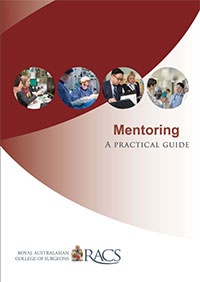Mentoring resources
On this page
Background

Mentoring has been identified as an important learning and development strategy for surgeons. RACS advocates for mentoring at all stages of a surgeon's education and throughout their career. Research has shown that having a mentor supports the achievement of personal and professional goals and improves motivation, engagement and work performance.
RACS has developed and run several of its own facilitated mentoring programs over a number of years with mixed results. In developing this resource, RACS has consulted with mentoring experts and reviewed the mentoring programmes offered by other medical colleges in order to provide a practical toolkit for surgery. This resource is aimed for use by Trainees, International Medical Graduates and Fellows for any stage that may be appropriate for them.
The foundation of this resource is based on the adapted components from the Australasian College for Emergency Medicine Mentoring Framework. This guide provides support to both a mentor and mentee. The website provides tools, templates and articles which will assist the mentor or mentee to understand their roles and responsibilities, helping to frame any mentoring relationship.
Resources for mentors and mentees
The Mentoring Framework follows the four distinct phases of an effective mentoring partnership:
- Preparing for mentoring
- Building the relationship,
- Developing the mentee, and
- Transitioning the relationship
Each phase is outlined below, or can be found in the RACS publication Mentoring: A Practical Guide (PDF 2.61MB).
This guide will assist mentors and mentees towards a positive and effective mentoring experience. It provides a summary of the concepts in each phase, as well as suggesting tasks to undertake and tools to use as you move through your mentoring journey.
All of the templates from the guide are also included below so that you have easy access to print copies as required.
Preparing for mentoring
The preparing for mentoring phase is all about getting ready for the mentoring experience. Mentoring pairs who take the time to prepare for the mentoring process tend to experience more successful and fulfilling mentoring relationships.
Tools and templates
- Mentor Self Reflection (PDF 67.58KB)
- Mentee Self Reflection (PDF 67.38KB)
- Mentor SWOT Analysis (PDF 71.7KB)
Useful reading
Building the relationship
The building the relationship phase is focused on the mentee and the mentor taking time to get to know each other, establish trust and rapport, and negotiate the expectations for the mentoring relationship.
Tools and templates
- Checklist for First Meeting (PDF 79.61KB)
- Role Perception Rating Scale (PDF 98.62KB)
- Confidentiality Protocol (PDF 141.24KB)
- Mentoring Session Summary (PDF 65.97KB)
- Mentoring Session Self Reflection (PDF 78.7KB)
- Mentor Session Attendance Record (PDF 69.41KB)
- Mentee SMART Goal Setting and Action Plan template (PDF 86.44KB)
- Mentoring Action Plan (PDF 68.19KB)
- Mentoring Agreement (PDF 85.22KB)
Useful reading
Developing the mentee
Developing the relationship phase is the most productive stage of the mentoring relationship and where the most time and energy is spent. Trust and rapport have now been developed so the mentor can begin to constructively challenge the mentee, probe their thinking and facilitating deeper learning.
Tools and templates
- Using Your Strengths (PDF 71.47KB)
- Mentoring Reflective Log (PDF 72.39KB)
- We have to talk: A step by step checklist for difficult conversations (PDF 100.04KB)
- 99 Powerful Coaching/Mentoring Questions (PDF 121.08KB)
- Wheel of Life (PDF 121.02KB)
Useful reading
Transitioning the relationship
The transitioning the relationship phase is the final stage of the mentoring relationship. The mentor and mentee roles will not exist indefinitely. In this phase, mentoring pairs redefine their roles from that of mentoring partners to a new professional relationship that will continue after the mentoring experience has concluded
Tools and templates
- Checklist for Mentors (PDF 77.99KB)
- Checklist for Mentees (PDF 78.99KB)
- Final Meeting and Evaluation (PDF 67.7KB)
Useful reading
Acknowledgements
RACS would like to thank the Australasian College for Emergency Medicine for use of their generic mentoring materials.
RACS has received Australian Government funding under the Specialist Training Program to provide this resource.
Contact
Royal Australasian College of Surgeons
College of Surgeons' Gardens
250-290 Spring Street
East Melbourne VIC 3002 Australia
Email: [email protected]
